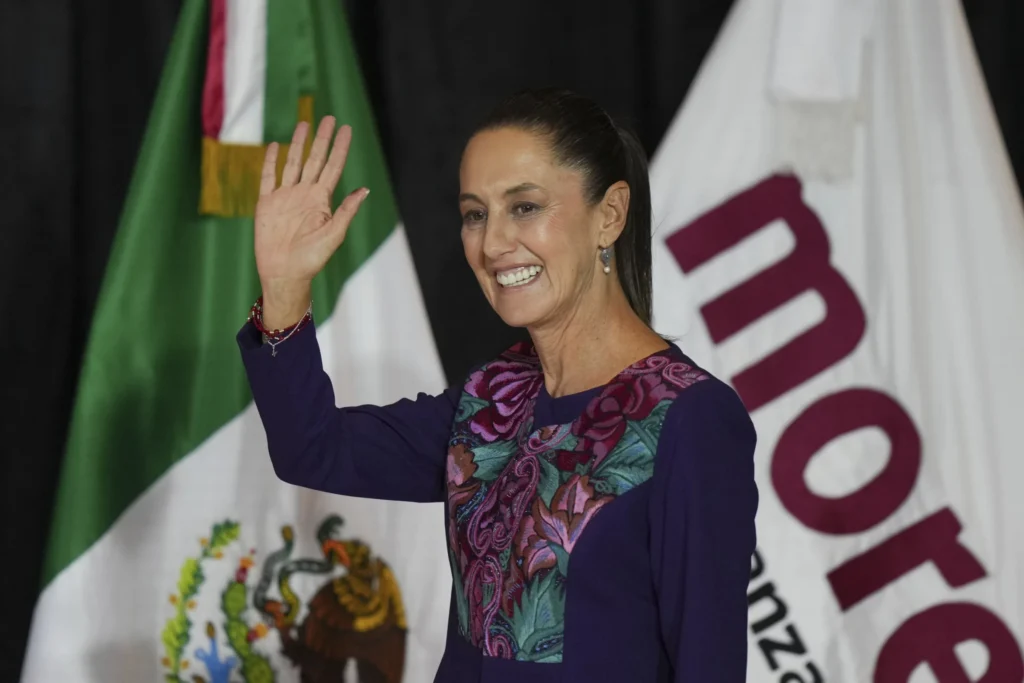SAO PAULO, Brazil – Claudia Sheinbaum won a landslide victory over Xochitl Gálvez in the June 2 election, making the former Mexico City mayor the country's first female president.
Her experience fighting violence in the capital and her determination to stick to the economic policies of her predecessor, fellow party member Andrés Manuel López Obrador, have made some Catholics optimistic about her administration.
Many analysts see violence as the most important challenge facing Scheinbaum during AMLO's term. [AMLO is the popular name used by the former president]By 2013, there were at least 30,000 murders each year. Although the government announced a slight decrease in the murder rate, this did not change public perception of the problem.
“In Mexico City, Father Seenbaum brought together three government agencies to fight crime and dramatically reduced the number of violent deaths,” said Father Alberto Gomez Sánchez, who runs a migrant facility in the southern state of Chiapas.
The conflict between the two major drug cartels has triggered an unprecedented wave of violence in the region, with local leaders, peasants and members of indigenous groups who dared to resist the mafia's illegal activities massacred in the past few months.
Related: Mexican priests meet with drug lords to negotiate peace
“Delinquency grows like a cancerous tumor, infiltrating the state, its institutions and even the Catholic Church. Some of the people who work with us as pastors have become accustomed to receiving money from the cartels,” he said. core.
Gómez blames previous administrations under Felipe Calderón and Enrique Peña Nieto for the expansion of criminal gangs in Chiapas and Mexico as a whole. AMLO has been unable to change that reality in just six years, but he argues that Sheinbaum now has the conditions to achieve even more success.
“She is a very bright woman and will inherit a country on a stronger footing from AMLO,” Gomez said.
Alberto Arciniega, who worked for Caritas Mexico for 20 years and now works for Caritas Continental, defined the violence as a huge “debt” that AMLO owes to the Mexican people.
“Sheinbaum's landslide victory over Galvez shows that the AMLO administration is well-liked by the public. Nevertheless, violence remains a major concern for everyone,” he said. core.
Arciniega, who lives in Mexico City, said Scheinbaum has been successful in reducing crime and creating a safer atmosphere among many people.
“I think she'll play an active role in fighting crime,” he added.
During the campaign, Scheinbaum signed the “Pledge for Peace,” a set of proposals developed by the church and numerous civic groups after two years of discussion with more than 1,600 organizations.
Related: Mexican presidential candidates embrace church's anti-violence proposals
The document covers seven main themes – social structure, security, justice, prisons, teenagers, governance and human rights – and includes dozens of measures that should be taken by government and social institutions to make the country peaceful.
On June 3, the church agency responsible for the National Peace Dialogue sent a letter to Scheinbaum to congratulate her and remind her of her commitment.
“We reiterate our commitment to dialogue and building bridges working for peace and justice, and express our readiness to meet in the coming weeks to define a path of cooperation towards implementing our peace commitments,” the message said.
Father Conrado Cepeda, a professor of social sciences at the Ibero-American University of Puebla, said key social issues such as managing violence and migration flows are directly related to the economy and the fight against poverty, and therefore will be crucial to Scheinbaum's ability to address such a crisis.
“Mexico has undergone many effective economic reforms in the past few years. The country is not seriously in debt, there have been investments in the public sector, the minimum wage has increased by 40 percent. Poverty has decreased,” he said. core.
If Scheinbaum can continue to fight poverty and grow the economy, crime may decrease, he said.
“An improving economy may also attract some of the migrants heading to the US border from the south. Of those migrants, more may choose to remain in Mexico,” Cepeda added.
The migration crisis is directly linked to the violence crisis, analysts like Cepeda say: Migrants from South and Central America, the Caribbean and other parts of the world are automatically caught up in the drug cartels' nets as soon as they arrive in the country.
RELATED: Church condemns murder and subsequent lynching in Mexico
“Mexican authorities are not handling the influx of migrants properly. There is widespread corruption and disorder and criminal gangs are quickly seizing control of the migrants,” said Cepeda, who previously headed Mexico's Jesuit refugee services.
He added that the arrival of big Chinese companies, combined with government mega-structural projects in the south – such as the Tren Maya, or Maya train, linking various tourist towns – could create wealth and new jobs and help some migrants integrate.
Gomez said people who visit migrant homes in Chiapas are hoping to find work and stay in Mexico if possible.
“Sheinbaum will continue to implement the industrial conglomerate that AMLO started, and he will need more workers, which will help direct immigration,” the priest said.
Arciniega said more Venezuelans and Haitians are trying to find work and integrate into life in Mexico City.
“Once the economy improves, there's room for more people to move in,” he said.
Though he's optimistic, Arciniega acknowledges he can't expect much change in the short term: Mexico's problems have been growing for decades, and easy solutions are not realistic.
“Social inequality remains huge. The rich just want to increase their wealth. They don't want to close the gap with the poor. That's the main cause of social problems and governments can't change it,” he explained.


